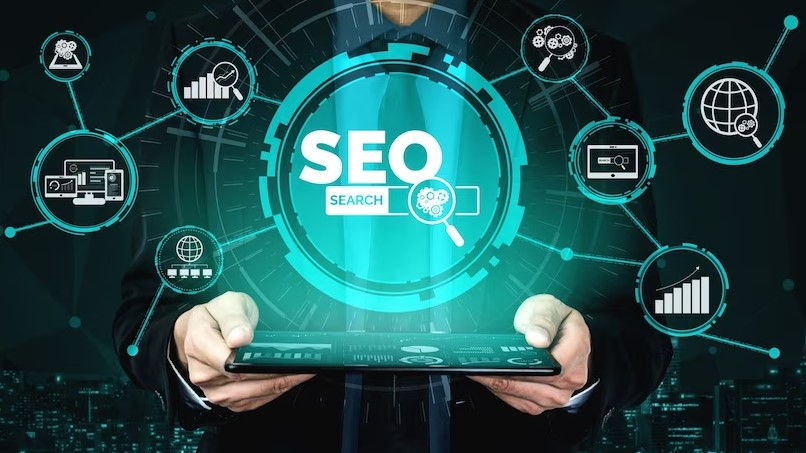SEO (Search Engine Optimization) technology) is a set of strategies, techniques, and tools used to improve a website’s visibility in search engine results pages (SERPs). It is crucial for digital marketing as it helps businesses attract organic traffic, enhance user experience, and achieve higher rankings on search engines like Google, Bing, and Yahoo.
This article will explore the fundamental aspects of SEO technology, including its components, benefits, types, and best practices.

1. Understanding SEO Technology
SEO (Search Engine Optimization) technology refers to the tools, techniques, and strategies used to improve a website's visibility on search engines like Google, Bing, and Yahoo. It involves optimizing website content, structure, and technical aspects to enhance rankings in search results. Key components of SEO technology include keyword research, on-page optimization, link building, mobile-friendliness, and page speed optimization. Advanced SEO also incorporates artificial intelligence, machine learning, and data analytics to refine strategies and improve search engine rankings. By leveraging SEO technology, businesses can drive organic traffic, increase online visibility, and enhance user experience, ultimately leading to higher conversions and brand credibility.
2. Importance of SEO Technology
SEO technology is vital for businesses, brands, and individuals looking to establish a strong online presence. In today's digital age, where millions of websites compete for visibility, SEO ensures that a website ranks higher on search engine results pages (SERPs), making it easier for users to discover relevant content, products, or services. A well-implemented SEO strategy can significantly impact website traffic, lead generation, and overall business growth by attracting high-intent users who are actively searching for solutions.
One of the primary benefits of SEO technology is increased organic traffic, which refers to visitors coming from unpaid search results. Unlike paid advertising, which requires continuous investment, SEO provides long-term value by maintaining search rankings and driving consistent traffic over time. Businesses that invest in SEO can build credibility and trust among users, as higher search rankings are often associated with authority and reliability. Additionally, SEO enhances user experience by optimizing website speed, mobile-friendliness, navigation, and content relevance, all of which contribute to lower bounce rates and higher engagement.
Another crucial aspect of SEO technology is its ability to keep businesses competitive. Search engine algorithms continuously evolve, and companies that leverage advanced SEO tools and techniques can adapt to these changes effectively. By using keyword research, competitor analysis, and data-driven insights, businesses can refine their content strategy and outperform competitors in search rankings. Moreover, technical SEO improvements, such as structured data, XML sitemaps, and secure website protocols (HTTPS), further contribute to better indexing and ranking by search engines.
SEO technology also plays a significant role in local search optimization, which is especially beneficial for small and medium-sized businesses. By optimizing for local SEO factors like Google My Business listings, location-based keywords, and customer reviews, businesses can attract nearby customers searching for products or services in their area. This is particularly important for brick-and-mortar stores, restaurants, and service-based businesses that rely on local foot traffic and customer engagement.
Furthermore, SEO reduces the dependency on paid advertising by offering a cost-effective and sustainable digital marketing approach. While paid ads can generate quick results, they require continuous spending, and traffic drops once the campaign ends. In contrast, SEO efforts, such as high-quality content creation and backlink building, provide lasting results that contribute to long-term success.
3. Key Components of SEO Technology
3.1 On-Page SEO
On-Page SEO refers to optimizations made directly on a website, including:
-
Title Tags: Optimized titles with relevant keywords.
-
Meta Descriptions: Concise summaries of web pages with keywords.
-
Headings (H1, H2, H3): Properly structured headings for readability.
-
Keyword Optimization: Strategic use of relevant keywords.
-
Internal Linking: Linking related pages within the website.
|
Factor |
Description |
|---|---|
|
Title Tags |
Optimized titles with relevant keywords |
|
Meta Descriptions |
Concise summaries of web pages with keywords |
|
Headings (H1, H2, H3) |
Properly structured headings for readability |
|
Keyword Optimization |
Strategic use of relevant keywords |
|
Internal Linking |
Linking related pages within the website |
3.2 Off-Page SEO
Off-Page SEO involves external factors that influence search rankings, such as:
-
Backlinks: Links from other websites that improve credibility.
-
Social Media Engagement: Sharing content on platforms like Facebook, Twitter, and LinkedIn.
-
Guest Blogging: Writing articles for other websites with backlinks.
-
Influencer Outreach: Collaborating with influencers for brand promotion.
3.3 Technical SEO
Technical SEO ensures that a website meets search engine requirements. Key aspects include:
-
Site Speed: Faster loading pages improve rankings.
-
Mobile-Friendliness: Responsive design for better user experience.
-
Secure Website (SSL): HTTPS encryption enhances trust.
-
XML Sitemap: Helps search engines index pages efficiently.
-
Robots.txt File: Guides search engines on which pages to crawl.
|
Factor |
Importance |
|
Site Speed |
Faster loading pages improve rankings |
|
Mobile-Friendliness |
Responsive design for better user experience |
|
Secure Website (SSL) |
HTTPS encryption enhances trust |
|
XML Sitemap |
Helps search engines index pages efficiently |
|
Robots.txt File |
Guides search engines on which pages to crawl |

4. Types of SEO Technology
4.1 White Hat SEO
Ethical SEO practices aligned with search engine guidelines:
-
Quality content creation.
-
Proper keyword usage.
-
Natural backlink building.
-
Fast and mobile-friendly website.
4.2 Black Hat SEO
Unethical techniques that can lead to penalties:
-
Keyword stuffing.
-
Link farming.
-
Cloaking.
-
Hidden text and links.
4.3 Gray Hat SEO
Techniques that fall between ethical and unethical practices:
-
Buying old domains for SEO advantage.
-
Slightly manipulating backlinking.
-
Clickbait content strategies.
5. Best SEO Tools and Software
Several tools help improve SEO performance. Popular ones include:
-
Google Analytics: Tracks website traffic and user behavior.
-
SEMrush: Competitive analysis and keyword research.
-
Ahrefs: Backlink analysis and SEO audit.
-
Moz: Domain authority and keyword tracking.
-
Yoast SEO: Optimizes content for WordPress users.
|
Tool |
Purpose |
|
Google Analytics |
Tracks website traffic and user behavior |
|
SEMrush |
Competitive analysis and keyword research |
|
Ahrefs |
Backlink analysis and SEO audit |
|
Moz |
Domain authority and keyword tracking |
|
Yoast SEO |
Optimizes content for WordPress users |
7. Future Trends in SEO Technology
The future of SEO technology is evolving rapidly with advancements in artificial intelligence, voice search, mobile-first indexing, and data-driven strategies. AI and machine learning are enhancing search engine algorithms, automating keyword research, and improving content optimization. Voice search is becoming more prominent with the rise of virtual assistants like Siri and Alexa, requiring businesses to focus on conversational queries and featured snippets. Mobile-first indexing and Core Web Vitals emphasize the importance of website speed, responsiveness, and user experience. Content quality remains crucial, with Google prioritizing Expertise, Experience, Authoritativeness, and Trustworthiness (E-E-A-T). Video and visual search optimization are also gaining traction, as users increasingly rely on image and video searches through platforms like Google Lens and YouTube. Zero-click searches, featured snippets, and hyper-personalization are shaping the way users interact with search results, making structured data and schema markup essential for visibility. Blockchain technology may impact SEO by enhancing data security and transparency, while ethical SEO practices, such as sustainable website optimization and responsible link-building, are becoming more important. As search engines become more intelligent, businesses must continuously adapt their strategies to improve user experience, stay competitive, and maximize online visibility in this ever-changing digital landscape.
SEO technology is an essential part of digital marketing, helping businesses achieve higher search rankings, increased traffic, and better user experience. By implementing on-page, off-page, and technical SEO strategies, along with utilizing advanced tools, websites can stay competitive in the ever-changing online landscape.
To stay ahead in SEO, businesses should continuously adapt to new trends, optimize their content, and monitor performance metrics. Investing in SEO technology today will yield long-term benefits in brand visibility, credibility, and overall growth.





.gif)














Sign in
to continue to ilmkidunya.com